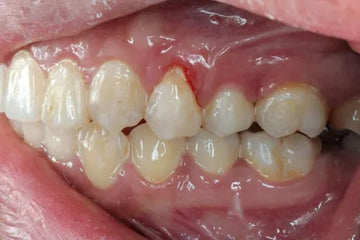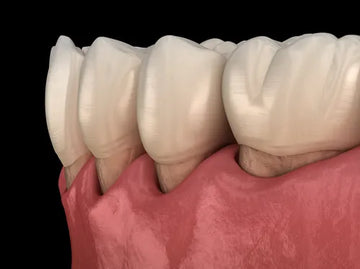7 Reasons Why You Should Switch to the Natural Homemade Toothpaste Today
Switching to natural homemade toothpaste is a smart choice for your oral health. It's a decision that benefits both you and the environment.
Natural toothpaste is free from harmful chemicals. It often contains simple, safe ingredients like baking soda and coconut oil. These ingredients are gentle yet effective.
Many people are concerned about fluoride in conventional toothpaste. Natural toothpaste offers fluoride-free options for those who prefer to avoid it. This makes it a great choice for families.
Natural toothpaste is also known for its teeth whitening properties. It can brighten your smile without harsh chemicals. Charcoal toothpaste, for example, is popular for its whitening benefits.
If you have sensitive teeth, natural toothpaste can be a soothing option. Its gentle ingredients help reduce irritation. This makes it ideal for those with dental sensitivities.
Eco-conscious consumers will appreciate the environmental benefits. Natural toothpaste often comes in biodegradable packaging. This reduces plastic waste and supports a sustainable lifestyle.
Making your own natural toothpaste is another option. Homemade recipes allow you to customize flavors and ingredients. It's a fun and educational project for families.
Natural toothpaste brands prioritize ethical sourcing. They often use organic ingredients, supporting sustainable agriculture. This aligns with a holistic approach to personal care.
Switching to natural toothpaste can improve your overall health. It reduces exposure to synthetic additives. This makes it a healthier choice for everyone, including children.
Many natural toothpastes are vegan and cruelty-free. They avoid animal testing and animal-derived ingredients. This supports a compassionate lifestyle.
Natural toothpaste can also help reduce bad breath. Essential oils provide antibacterial benefits. This keeps your mouth fresh and clean.
Choosing natural toothpaste is a step towards a healthier, more sustainable lifestyle. It's a simple change with significant benefits. Make the switch today and experience the difference.
The Importance of Choosing Natural Toothpaste
Choosing the right toothpaste is vital for your oral health and overall well-being. Natural toothpaste is gaining popularity due to its numerous benefits.
One of the primary reasons people opt for natural toothpaste is the avoidance of harmful chemicals. Conventional toothpastes often contain ingredients like sodium lauryl sulfate (SLS) and triclosan. These can cause irritation and have been linked to health concerns.
Natural toothpaste focuses on using gentle, nontoxic ingredients. This makes it a safer choice for both adults and children. Parents, in particular, find it reassuring to provide products without risky chemicals for their families.
The use of fluoride in traditional toothpaste is a contentious topic. While fluoride has cavity-fighting properties, some prefer to avoid it due to potential health risks. Natural toothpaste often offers fluoride-free versions, giving consumers a choice.
Natural toothpaste often includes baking soda or activated charcoal for gentle whitening. These ingredients can effectively remove surface stains without harsh abrasives. This means users can achieve a brighter smile naturally.
People with sensitive teeth frequently turn to natural toothpaste for relief. Conventional toothpastes with harsh additives can exacerbate sensitivity. On the other hand, natural alternatives often contain soothing ingredients, reducing discomfort.
Supporting the environment is another compelling reason to choose natural toothpaste. Many brands use sustainable practices and packaging. This helps reduce the environmental footprint, aligning with eco-friendly values.
Here are some key benefits of using natural toothpaste:
- Reduces exposure to synthetic chemicals
- Offers fluoride-free options
- Utilizes gentle, effective whitening ingredients
- Supports environmental sustainability
- Provides relief for sensitive teeth
By opting for natural toothpaste, you also support brands that prioritize ethical practices. Many natural toothpaste companies focus on fair-trade and organic ingredients, ensuring that their production methods are environmentally and socially responsible.
Switching to natural toothpaste aligns with living a more conscious lifestyle. It reflects a commitment to personal health and the planet. Many users report improved oral health and a sense of well-being after making this change.
Choosing natural toothpaste is not just a trend; it's a mindful decision. It signifies a shift towards valuing natural, safe products in daily routines. This choice can lead to greater awareness about other personal care products as well.
Finally, natural toothpaste is accessible and easy to incorporate into your routine. With many options available in stores and online, it's simple to find a product that fits your needs and values. Make the switch and enjoy the numerous advantages it brings to your life and the environment.
What is Natural Toothpaste?
Natural toothpaste is an alternative to conventional toothpastes that avoids synthetic chemicals. It leverages natural ingredients to promote oral health.
Unlike standard toothpastes, which may contain artificial flavors and chemicals, natural versions focus on simplicity and purity. This appeals to consumers seeking healthier options.
A key feature of natural toothpaste is the absence of harsh chemicals like sulfates. These toothpastes are free from artificial colors and preservatives, making them a clean choice.
Natural toothpaste often incorporates plant-based ingredients that offer antibacterial and anti-inflammatory benefits. This enhances the overall health of your gums and teeth naturally.
Consumers opt for natural toothpaste for its safer and eco-friendly composition. Here are typical forms you might encounter:
- Fluoride-free toothpastes: Ideal for those avoiding fluoride.
- Charcoal-infused varieties: Known for whitening properties.
- Herbal blends: Utilizes plants like neem and sage.
- Baking soda formulas: Natural stain removers.
- Essential oil blends: Offers flavor and oral benefits.
Definition and Types
Natural toothpaste refers to formulations emphasizing ingredients from nature. It avoids synthetic substances, making it a popular choice for health-conscious individuals.
Fluoride-free natural toothpaste is a common type. It caters to those wary of fluoride, offering peace of mind without compromising dental health.
Some natural toothpastes include activated charcoal. This ingredient is prized for its whitening ability while removing impurities.
Herbal toothpastes rely on plants known for their dental benefits. Ingredients like neem, tea tree oil, and peppermint play crucial roles here.
Baking soda toothpaste is another popular type among natural options. It offers gentle polishing, helping reduce stains without causing tooth wear.
Oil-infused natural toothpastes leverage the power of essential oils. Popular oils include peppermint, clove, and spearmint, which not only add flavor but may support antibacterial activities.
In summary, natural toothpaste comes in various forms. Each type caters to different needs, whether whitening, sensitivity relief, or simply avoiding chemicals.
Ingredients in Natural Toothpaste
Natural toothpaste distinguishes itself by using safe, effective ingredients. These ingredients are key to its health benefits and appeal.
Common natural toothpaste ingredients include baking soda, which gently cleans and polishes teeth. It aids in reducing surface stains without harsh abrasives.
Coconut oil is another staple in natural toothpaste. It has antibacterial properties and helps maintain moisture in your mouth.
Essential oils play a significant role too. Oils like peppermint and tea tree serve dual purposes, flavoring while promoting antibacterial health.
Activated charcoal, known for absorbing plaque and impurities, offers a natural whitening agent. It's favored for its staining-fighting characteristics.
- Baking soda: For gentle stain removal
- Coconut oil: Provides antibacterial benefits
- Essential oils: Adds flavor and oral health benefits
- Activated charcoal: Aids in whitening
- Glycerin: Keeps toothpaste moist
- Xylitol: A natural sweetener and bacteria inhibitor
Xylitol, derived from plant sugars, acts as a sweetener while helping inhibit harmful bacteria. This dual role makes it popular in natural formulations.
Glycerin is included to keep toothpaste moist and to enhance texture. It’s derived from plant oils, maintaining a natural status.
Thus, natural toothpaste brings together a variety of effective, nontoxic ingredients. These focus on delivering oral health benefits without harmful additives.
Health Benefits of Natural Toothpaste
Switching to natural toothpaste offers a range of health benefits. This is primarily due to its pure and gentle ingredient profile.
One of the most notable advantages is the reduced exposure to potentially harmful chemicals. Unlike conventional toothpaste, natural options avoid synthetic additives.
Fluoride-free natural toothpaste offers peace of mind for those conscious about fluoride intake. This makes them suitable for individuals and families seeking safer alternatives.
Another key benefit is the natural whitening effect. Ingredients like baking soda and charcoal gently remove stains, revealing a brighter smile without harsh bleaches.
To summarize, natural toothpaste supports oral health holistically. Here are some primary benefits it offers:
- Safe for sensitive teeth: Gentle ingredients prevent irritation.
- Natural teeth whitening: Enhances brightness without chemicals.
- Chemical-free: Avoids synthetic additives and preservatives.
- Supports gum health: Herbal extracts reduce inflammation.
- Suitable for kids: Free from toxic elements.
Reduced Exposure to Chemicals
Using natural toothpaste significantly reduces chemical exposure. Conventional toothpaste often contains sulfates, triclosan, and artificial colors, which some prefer to avoid.
Natural toothpaste offers a chemical-free experience by eliminating these synthetic components. This lowers the risk of adverse reactions and long-term health concerns.
The natural ingredients used contribute to a cleaner and safer oral hygiene routine. Many of these components, like coconut oil and essential oils, are gentle yet effective.
This reduced chemical exposure benefits those with sensitive mouths. It is especially advantageous for individuals with allergies or sensitivities to harsh substances.
Sensitive populations, such as pregnant women or young children, find natural toothpaste beneficial. It excludes potentially harmful substances that could affect their health.
Overall, using natural toothpaste can lead to a healthier lifestyle choice. It's suitable for anyone looking to lessen their contact with unnecessary chemicals:
- Free from artificial additives: Avoids synthetic colorings and flavors.
- Non-toxic ingredients: Safe for everyday use.
- Gentle on gums: Ideal for sensitive oral tissues.
- Allergen-conscious formulation: Reduces risk of irritation or reactions.
- Environmentally friendly chemicals: Promotes cleaner personal care.
Support for Oral Health
Natural toothpaste contributes to enhanced oral health. It promotes stronger teeth and healthier gums with its active natural components.
The absence of harsh abrasives helps maintain enamel integrity. Ingredients like baking soda provide gentle scrubbing, effective without being damaging.
Additionally, natural toothpaste often includes herbal extracts supporting gum health. These plant-based ingredients can reduce inflammation and fight bacteria.
Essential oils, prevalent in natural formulations, offer antimicrobial properties. They help in reducing oral pathogens, preventing cavities and gum disease.
Incorporating xylitol into the formula aids in reducing harmful bacteria. This natural sweetener promotes a healthier oral microbiome, supporting overall dental health.
Ultimately, natural toothpaste provides a holistic approach to oral care. Here’s how it supports your mouth:
- Enhances enamel strength: Mild ingredients preserve protective enamel.
- Promotes gum health: Herbal components reduce inflammation.
- Reduces cavity risk: Xylitol and other agents inhibit bacteria.
- Maintains balanced oral flora: Ensures a healthy oral environment.
- Natural antimicrobial action: Essential oils protect against pathogens.
Natural toothpaste blends nature's best with science to create a product that fosters long-term oral health. Its gentle formula makes it an ideal choice for those prioritizing both safety and efficacy in their dental care routine.
Environmental Impact
Natural toothpaste is not only beneficial for personal health but also for the environment. Opting for these eco-friendly options can significantly reduce your carbon footprint.
The production process of natural toothpaste often involves sustainable practices. This includes ethical sourcing and reduced use of synthetic chemicals.
By choosing natural toothpaste, you support ecological balance. Many of these products are biodegradable, minimizing pollution.
Switching to natural toothpaste means contributing to a cleaner planet. This is crucial as the accumulation of non-biodegradable waste poses a serious threat.
To summarize, here are some key environmental benefits:
- Reduced chemical runoff: Protects aquatic life by minimizing synthetic waste.
- Biodegradable formulations: Lessens landfill impact.
- Sustainable sourcing: Supports responsible resource management.
- Minimal resource use: Eco-conscious production processes.
- Lower carbon emissions: Promotes an eco-friendly lifestyle.
Sustainable Ingredients
Sustainable ingredients form the core of natural toothpaste. These elements are selected for their minimal environmental impact.
Organic farming methods often produce ingredients for natural toothpaste. This reduces chemical use and supports biodiversity.
Many natural toothpastes feature herbal extracts and essential oils. These promote oral health while being eco-friendly.
Coconut oil, baking soda, and xylitol are common sustainable ingredients. They are effective yet gentle on the environment.
By using natural toothpaste, you support sustainable agriculture. This helps conserve resources while maintaining health.
Key sustainable ingredients include:
- Coconut oil: Biodegradable and supports oral hygiene.
- Essential oils: Provides natural antimicrobial effects.
- Xylitol: Plant-derived and reduces cavity-causing bacteria.
- Baking soda: An environmentally safe cleaning agent.
- Herbal extracts: Natural and sustainably sourced for oral health.
Eco-Friendly Packaging
Eco-friendly packaging is another advantage of natural toothpaste. Many brands focus on reducing plastic waste by using sustainable packaging materials.
Biodegradable or recyclable materials are often employed. This helps lessen the environmental burden of toothpaste tubes and boxes.
Some companies even offer refillable packaging, further minimizing waste. By opting for these products, you contribute to a circular economy.
Using eco-friendly packaging aligns with a zero-waste lifestyle. This reduces both production and post-use environmental impact.
Companies prioritize transparency in their packaging choices. This commitment to sustainability reflects broader environmental goals:
- Recyclable materials: Simple to process and reuse.
- Biodegradable options: Breaks down naturally without polluting.
- Refillable containers: Minimizes single-use waste.
- Plastic-free packaging: Reduces petroleum-based pollution.
- Transparent labeling: Informs consumers and encourages eco-conscious decisions.
By choosing natural toothpaste, you contribute to both your health and the planet's health. Making an environmentally conscious choice can inspire broader change.
Comparison with Conventional Toothpaste
When comparing natural and conventional toothpaste, the differences are striking. Conventional toothpaste often contains synthetic ingredients. This includes fluoride, sodium lauryl sulfate, and artificial flavors.
Natural toothpaste, on the other hand, relies on organic and simple ingredients. These are typically free from harsh chemicals and additives. This makes them a safer choice for many people.
Health-conscious consumers prefer natural toothpaste. They aim to avoid chemical exposure while maintaining oral health. This shift is driven by increasing awareness of ingredient safety.
Conventional toothpaste may offer instant fresh breath and whitening. However, natural options provide a safer long-term solution. They gently clean without compromising health or the environment.
Here’s a quick comparison:
- Ingredients: Natural uses organic, conventional uses synthetic.
- Health impact: Natural minimizes chemical exposure.
- Environmental effect: Natural tends to be more eco-friendly.
- Whitening agents: Natural uses gentle, non-toxic alternatives.
Fluoride vs. Non-Fluoride Options
Fluoride is a common ingredient in many conventional toothpastes. It helps in preventing cavities and strengthening enamel. However, some people opt for fluoride-free toothpaste due to potential health concerns.
Natural toothpaste often offers fluoride-free formulations. These appeal to those seeking to avoid chemical additives. They achieve oral health benefits through alternative natural ingredients.
There is an ongoing debate about fluoride's safety. Some studies suggest it can lead to dental fluorosis if ingested excessively. This has led to a growing interest in fluoride-free alternatives.
People with specific health conditions often choose non-fluoride toothpaste. It eliminates the risk of fluoride exposure and aligns with holistic health practices. This makes it a suitable choice for sensitive users.
Consider the following when choosing between fluoride and non-fluoride:
- Health concerns: Evaluate personal health needs.
- Desired benefits: Prioritize cavity prevention or gentle ingredients.
- Individual preferences: Consider personal comfort with fluoride use.
- Demographics: Children might benefit from fluoride-free options due to swallowing risks.
Effectiveness in Oral Hygiene
Effectiveness is a critical factor when selecting toothpaste. Conventional toothpaste is known for providing quick results. This includes fresh breath and immediate whitening effects.
Natural toothpaste may not produce instant results. However, it works effectively over time. Its gentle, consistent use supports long-term oral health without harming enamel.
Natural toothpaste incorporates ingredients like baking soda and activated charcoal. These are renowned for their stain-removing properties. They serve as a natural alternative to chemical whitening agents.
Many natural toothpastes contain essential oils like peppermint and tea tree. These offer antibacterial benefits and help reduce plaque naturally. They ensure teeth and gums remain healthy without chemical intervention.
Deciding on the most effective toothpaste involves considering both short-term and long-term benefits:
- Whitening: Conventional offers immediate results; natural provides gentle, sustained whitening.
- Plaque reduction: Essential oils in natural toothpaste support antibacterial protection.
- Stain removal: Baking soda and charcoal naturally polish teeth.
- Freshness: Essential oils give a fresh feel without synthetic flavors.
Popular Natural Toothpaste Brands
Exploring natural toothpaste brands can open a gateway to healthier oral care. Many brands emphasize sustainability and ingredient purity. They offer options that are free from harmful substances.
Some brands focus on providing all-natural, organic formulations. They avoid synthetic chemicals, making them appealing to health-focused consumers. Their products cater to various oral health needs and preferences.
For those seeking quality and reliability, several brands stand out. Tom's of Maine is a popular choice known for its environmentally friendly practices. Hello Products offers fluoride and fluoride-free options with appealing flavors.
Dr. Bronner's is another brand committed to organic ingredients. Their toothpaste is vegan and free from synthetic detergents. Neem and Tea Tree by Desert Essence are sought for their antibacterial properties.
Here's a brief list of notable natural toothpaste brands:
- Tom's of Maine: Known for diverse, gentle formulations.
- Hello Products: Offers fun, refreshing flavors.
- Dr. Bronner's: Focuses on fair trade and organic ingredients.
- Desert Essence: Promotes oral health with tea tree and neem.
- Jason Natural: Provides options with no harsh chemicals.
Choosing the right brand depends on personal needs. Consider factors like ingredient list, flavor variety, and brand philosophy. With the right choice, you can enhance oral health naturally while supporting eco-friendly values.
All of the brands make big claims but they falter in many ways to really achieve even a natural product. They use things like glycerine which is highly synthetic refined seed oil derived sugar alcohol. It blocks remineralization, coats teeth and is hydrolyzed soybean oil sugar. Unless you use organic glycerine which comes from flax, which non of them too. So we would highly recommend using TranscenDental instead of any of these brands.
How to Make Your Own Natural Toothpaste
Creating your own natural toothpaste is simple and rewarding. It allows you to control every ingredient. You can ensure that nothing harmful goes into your mouth.
The process of making toothpaste at home is cost-effective. It also allows for customization. Tailor your toothpaste to meet specific oral health needs and personal preferences.
Homemade toothpaste is typically free of artificial flavors and preservatives. This makes it a healthier option. It's ideal for families looking to reduce exposure to harmful chemicals.
You can find many recipes online. Most require only a few basic ingredients. This makes the process straightforward for anyone to undertake.
A homemade solution lets you experiment with flavors and textures. This ensures you have a toothpaste that suits both adults and children. Here’s how to get started.
Simple Recipes
Making toothpaste at home doesn’t have to be complex. Start with a simple base. Baking soda is a popular choice due to its mild abrasiveness and cleansing properties. We love a good baking soda toothpaste.
Coconut oil can be added for its antibacterial benefits. It also helps bind the ingredients together. Peppermint essential oil adds a refreshing flavor and has antibacterial effects.
A typical recipe might look like this:
- 1 tablespoon baking soda: Acts as a gentle abrasive.
- 2 tablespoons coconut oil: Binds ingredients and provides antibacterial properties.
- 10 drops peppermint essential oil: Adds flavor and freshness.
Combine these ingredients into a paste. Store in a small jar. Use as needed for daily brushing.
Adjust the recipe to meet your preferences. Add activated charcoal for whitening or a pinch of stevia for sweetness. The possibilities are endless.
Trying different recipes can be a fun family project. It encourages everyone to participate in healthier oral care habits. Enjoy the creativity and benefits of homemade toothpaste.
Or just stick the hassle and try our organic natural charcoal toothpaste here.
Best Ingredients to Use
When making your own toothpaste, selecting the right ingredients is key. Each plays a unique role in oral health. Baking soda is a popular choice for its gentle cleaning abilities.
Coconut oil is another essential ingredient. Its antimicrobial properties make it excellent for oral hygiene. It also helps create a smooth, pleasant texture.
Essential oils not only enhance flavor but provide therapeutic benefits. Peppermint oil freshens breath. Tea tree oil offers antiseptic properties. Eucalyptus oil has anti-inflammatory benefits.
Calcium carbonate is another ingredient to consider. It acts as a mild abrasive. This helps gently polish teeth while providing essential minerals.
For those looking to whiten teeth naturally, activated charcoal is effective. It's known for its ability to adsorb stains and impurities. Use it sparingly to avoid mess and abrasiveness.
Here’s a list of beneficial ingredients for homemade toothpaste:
- Baking soda: Cleans and whitens.
- Coconut oil: Binds and fights bacteria.
- Peppermint essential oil: Freshens breath.
- Tea tree essential oil: Provides antiseptic benefits.
- Calcium carbonate: Polishes and remineralizes.
But if you don't feel like doing all that work and you want something far better then try our toothpaste here.
Experimenting with these ingredients can lead to discovering your ideal formula. Homemade toothpaste provides a personalized, chemical-free oral care solution. With creativity and natural ingredients, you can enjoy a healthy, radiant smile.





